

Using Diaries for Social Research - Andy Alaszewski. `The book has no competitor; it summarises the development of the method, follows through all stages of research from accessing subjects through design to analysing diary information as data, and considers how the method can best be exploited and used.
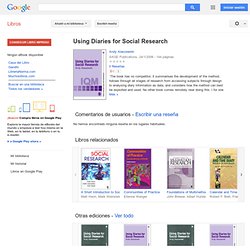
No other book comes remotely near doing this. I for one shall be using it gratefully as the single best text for diary research' - Professor Anthony P Macmillan Coxon, Honorary Professorial Fellow, University of Edinburgh In this accessible and lucid introductory text, Andy Alaszewski considers the analysis of diaries as a distinctive research technique in its own right. Nothing has previously covered this area in single-volume format, but the timely emergence of Using Diaries for Social Research recognizes the increased interest in and relevance of diary methodology within social research teaching.
Bibliogroup:"Introducing Qualitative Methods series" DSS Data Subject Guides. English Repository. Analysis PDF Ebooks. References, A. Fewer Latinos will speak Spanish, more non-Latinos will, report says. Darlene with her two youngest daughters, Emily and Hailey.
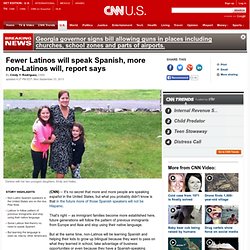
Non-Latino Spanish speakers in the United States are on the rise, Pew findsLatinos to follow pattern of previous immigrants and stop using their native languageSome Latinos feel there's no need to speak SpanishBut learning the language is seen as vital by other Americans (CNN) -- It's no secret that more and more people are speaking español in the United States, but what you probably didn't know is that in the future more of those Spanish speakers will not be Hispanic. That's right -- as immigrant families become more established here, future generations will follow the pattern of previous immigrants from Europe and Asia and stop using their native language. But at the same time, non-Latinos will be learning Spanish and helping their kids to grow up bilingual because they want to pass on what they learned in school, take advantage of business opportunities or even because they have a Spanish-speaking spouse. Hispanics in the U.S. Classroom Observation Instruments.
HighWire. The Three Month Thesis. I believe that just because a PhD is difficult, that doesn’t mean it has to be painful or stressful, IF you know how to approach it The painless PhD is a video course covering everything you need to know to succeed in your PhD Click here for more details About James Hayton I completed my PhD in physics at the University of Nottingham in 2007After three-and-a-half difficult years of research, I overcame severe procrastination and self-doubt and wrote my entire thesis in just 3 monthsI now work with students to help make the process easier, and I share what I know and learn on this blog (Full Bio)
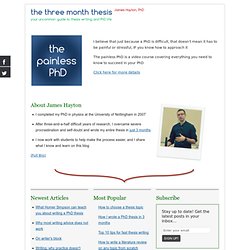
Top 10 tips for fast thesis writing. 1- Decide when to start You have to decide when you are going to write.
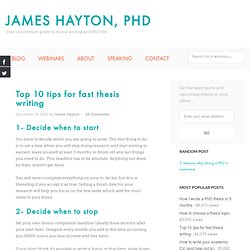
The first thing to do is to set a date when you will stop doing research and start writing in earnest, leave yourself at least 3 months to finish off any last things you need to do. This deadline has to be absolute. Anything not done by then, doesn’t get done. You will never complete everything on your to-do list, but this is liberating if you accept it as true. 2- Decide when to stop Set your own thesis completion deadline (ideally three months after your start date). If you don’t think it’s possible to write a thesis in that time, write down every reason why not, and ask yourself if it’s impossible, or just difficult. 3- Set mini-deadlines for each chapter You should already have a rough idea of what your content will be (in terms of chapter titles and so on, so set a deadline for completion of each chapter. 4- Set easy targets for each day Aim to do 500 words every day.
If you have a choice, work from home. Emigrantes Retornados. En memoria de Alberto Alday Garay Durante décadas algunos académicos y políticos consideraron inevitable, e incluso deseable, la asimilación gradual y linear de inmigrantes en las sociedades de acogida.
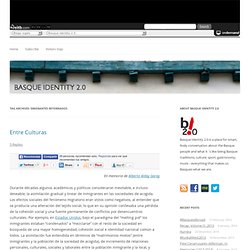
Doing action research – what’s in it for teachers and institutions? by Anne Burns « IH Journal. Over the last 20 years discussions of practitioner action research (AR) have become more and more common in the English language teaching (ELT) literature (e.g.
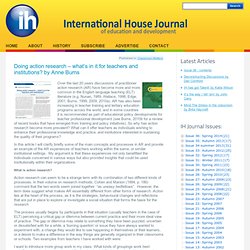
Nunan, 1989, Wallace, 1998, Edge, 2001; Burns, 1999, 2009, 2010a). AR has also been increasing in teacher training and tertiary education programs across the world, and in some countries it is recommended as part of educational policy developments for teacher professional development (see Burns, 2010b for a review of recent books that have emerged from training and policy initiatives). So why has action research become more prevalent? What can it offer teachers as individuals wishing to enhance their professional knowledge and practice, and institutions interested in sustaining the quality of their programs? In this article I will clarify briefly some of the main concepts and processes in AR and provide an example of the AR experiences of teachers working within the same, or similar institutional settings.
Ways of doing AR.